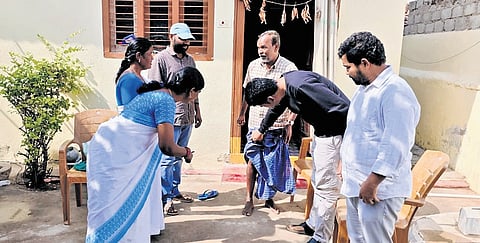

NALGONDA: The Nalgonda district administration has launched a comprehensive survey to evaluate fluorine levels in Marriguda mandal, an area historically associated with high fluorine content in drinking water.
Notably, Bhatlapalli village in the mandal once recorded 29 mg in a litre of water, the state’s highest fluorine concentration.
The survey, initiated on the order of district Collector Ila Tripathi will cover 40 villages, including remote areas. Asha workers are conducting door-to-door assessments to gather data on the prevalence and impact of fluorine contamination.
The issue of fluorine has dictated the narrative during elections for decades with Congress and BRS (formerly TRS) vowing to eradicate it. After forming the government in 2014, BRS launched the Mission Bhagiratha scheme to address the problem, constructing overhead water tanks and providing tap connections in affected villages.
In 2020, the then chief minister K Chandrasekhar Rao announced in the Assembly that fluorine contamination in Nalgonda had been completely eradicated due to the scheme. However, the Congress alleged that Mission Bhagiratha failed, citing irregularities in the water supply and continued contamination in some areas.
Since coming to power last year, the Congress administration acknowledged that fluorine contamination persists in some mandals. The government proposed the Srisailam tunnel project as a permanent solution, criticising the previous administration for neglecting the project and promising its completion during their tenure.
Against this backdrop, the district administration’s current survey in Marriguda has drawn scepticism, with some suspecting political motives. However, officials have denied any such involvement.
Speaking to TNIE, District Medical and Health Officer P Srinivas clarified that the survey was being conducted purely for public health purposes. “Asha workers are identifying cases of dental and skeletal fluorosis and categorising them as mild, moderate or severe,” he said.
Dr Srinivas said that the survey aims to safeguard future generations, adding that no new cases of fluorosis have been reported so far during the week-long assessment.